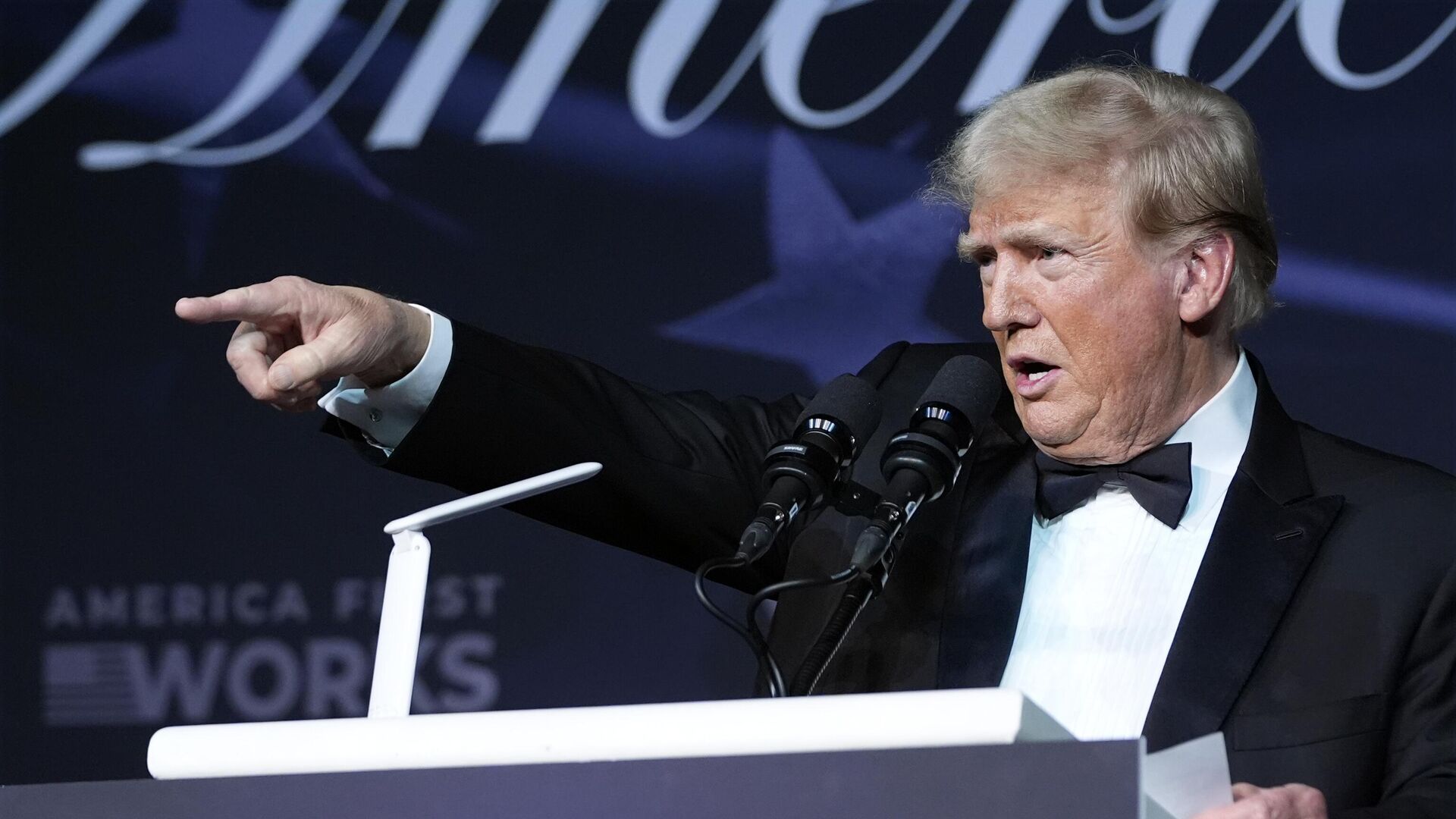https://sputniknews.in/20250325/trumps-main-target-is-china-not-india-industry-sources-8898675.html
Trump’s Main Target is China, Not India: Industry Sources
Trump’s Main Target is China, Not India: Industry Sources
Sputnik India
Last week’s bull run at Indian capital markets has demonstrated that despite the US President Donald Trump's looming reciprocal tariff threats on 2 April, Indian investors remain optimistic, industry sources said
2025-03-25T08:25+0530
2025-03-25T08:25+0530
2025-03-25T18:36+0530
donald trump
narendra modi
china
us
india
trade barriers
cargo ship
regional connectivity
government of india
persian gulf (arabian gulf)
https://cdn1.img.sputniknews.in/img/07e9/01/1d/8714815_0:0:3066:1725_1920x0_80_0_0_ccb874e8344f53708d635afc07bd0529.jpg
Despite the US President Donald Trump criticising India on multiple occasions for imposing higher tariffs on American imports, India Inc remains bullish about the growth prospects and government’s ability to navigate the global tariff war, Indian industry sources told Sputnik India.While the new US President continues to criticise India over tariffs, there is also a sentiment that he has to draw a line somewhere between India and China, or China or any other country for that matter, they added.Quoting Trump’s words from an interview given to Breitbart News last week, they said that Trump enjoyed a “very good relationship” with India barring the issue of tariffs.They noted that some of India’s biggest ports, including Mundra, operated by Adani Ports and Special Economic Zone, relied on Chinese cranes. Similarly, India still relies on Chinese expertise and imports in the solar industry, despite having one of the biggest Solar PV companies in the world, the sourses added.“India has been making impressive strides in reducing logistics cost, thanks to initiatives such as National Logistics Policy (NLP), Gati Shakti as well as Sagarmala,” they said.India has projects such as the India-Middle-East Europe Economic Corridor (IMEEC), that are being backed by the Trump administration, industry sources underscored. India has also operationalised a major transhipment hub Vizhinjam port on the Arabian Sea, which is expected to play a major role in boosting India’s stature as a regional hub in coming years, they added."Further, they stated that Indian business circles are optimistic that the benefits of major government initiatives, such as Atmanirbhar Bharat, Sagarmala, and the PLI-linked scheme, will be realized in the coming years.Another sector which could benefit from an intensified US-China trade war under the Trump administration could be India’s chemical exports, Ajay Joshi, the Founder of Ajay Joshi Chemicals, told Sputnik India.He noted that the US accounted for 14% of Indian chemicals exports (worth $2.9 billion) last fiscal, making it the biggest market for India’s chemicals industry.Joshi underscored that key Indian companies active in the space of oil and gas chemicals, fluoro-chemicals and agrochemicals contact manufacturing might see a surge in orders as US customers decouple from Chinese suppliers in the near future.Professor Ashwani Mahajan, the co-convenor of Swadeshi Jagran Manch (SJM), echoed the optimistic sentiment, noting that several factors have led to a rebound in the Indian capital markets, which had been reeling under the impact of US tariff threats.“These trends also indicate that Indian investors remain aware of India’s favourable position in any tariff war in the future. One could expect a boom in manufacturing in coming months and years, thanks to schemes such as Atmanirbhar Bharat and awarding PLIs [Production Linked Incentives] in crucial sectors,” he explained.“So, one could expect a recalibration of the policy to maximise the opportunities arising from these global disruptions,” the SJM co-convenor stated.“We must look for a better bargain for our farmers. We remain confident about the government’s capability to continue defending the interest of the Indian farmer,” Mahajan concluded.A report by the US Department of Agriculture (USDA) this month said that the Trump administration was looking to get greater access to the Indian market for three US crops—maize, soybean and cotton.Meanwhile, India thinktank Global Trade Research Initiative (GTRI) has warned that Trumps’ reciprocal tariff plan might end up hurting Indian exporters in sectors such as pharmaceuticals.
https://sputniknews.in/20250324/us-plans-billion-dollar-penalties-on-chinese-shipping-sparks-fears-of-trade-apocalypse-8896117.html
china
us
india
persian gulf (arabian gulf)
arabian sea
Sputnik India
feedback.hindi@sputniknews.com
+74956456601
MIA „Rossiya Segodnya“
2025
Dhairya Maheshwari
https://cdn1.img.sputniknews.in/img/07e6/0c/13/138962_0:0:641:640_100x100_80_0_0_2cb44360dbcdf6d84bf4b299cd045917.jpg
Dhairya Maheshwari
https://cdn1.img.sputniknews.in/img/07e6/0c/13/138962_0:0:641:640_100x100_80_0_0_2cb44360dbcdf6d84bf4b299cd045917.jpg
News
en_IN
Sputnik India
feedback.hindi@sputniknews.com
+74956456601
MIA „Rossiya Segodnya“
Sputnik India
feedback.hindi@sputniknews.com
+74956456601
MIA „Rossiya Segodnya“
Dhairya Maheshwari
https://cdn1.img.sputniknews.in/img/07e6/0c/13/138962_0:0:641:640_100x100_80_0_0_2cb44360dbcdf6d84bf4b299cd045917.jpg
trump india, trump news, trump tariffs, trump tariff wars, trump tariffs on india, us china trade war, trump modi meeting, modi news, modi trump news, trump reciprocal tariffs, imeec, indian pharma exports, india agricultural exports, trump criticises india, trump brics, trump dedollarisation
trump india, trump news, trump tariffs, trump tariff wars, trump tariffs on india, us china trade war, trump modi meeting, modi news, modi trump news, trump reciprocal tariffs, imeec, indian pharma exports, india agricultural exports, trump criticises india, trump brics, trump dedollarisation
Trump’s Main Target is China, Not India: Industry Sources
08:25 25.03.2025 (Updated: 18:36 25.03.2025) Last week’s bull run at Indian capital markets has demonstrated that despite the US President Donald Trump's looming reciprocal tariff threats on 2 April, Indian investors remain optimistic, industry sources have told Sputnik India.
Despite the US President Donald Trump criticising India on multiple occasions for imposing higher tariffs on American imports, India Inc remains bullish about the growth prospects and government’s ability to navigate the global tariff war, Indian industry sources told Sputnik India.
“There is a reason why Indian stock markets have been rebounding since US President Donald Trump indicated some flexibility with respect to tariffs. Firstly, India Inc is clear that Trump’s main target is China and not India,” the sources pointed out.
While the new US President continues to
criticise India over tariffs, there is also a sentiment that he has to draw a line somewhere between India and China, or China or any other country for that matter, they added.
In Trump’s worldview, China always was and would continue to be not only the global biggest strategic threat, but also a bigger economic threat than India, the sources said.
Quoting Trump’s words from an interview given to Breitbart News last week, they said that Trump enjoyed a “very good relationship” with India barring the issue of tariffs.
“So, one needs to understand that Trump’s action is aimed at ending the Chinese dominance in global supply chains, be it solar panels, heavy machinery, critical minerals, textiles or pharmaceuticals to name a few,” industry sources said, offering a perspective shared by quite a few in Indian business circles.
They noted that some of India’s biggest ports, including Mundra, operated by Adani Ports and Special Economic Zone, relied on Chinese cranes. Similarly, India still relies on Chinese expertise and imports in the solar industry, despite having one of the biggest Solar PV companies in the world, the sourses added.
Diving into the ongoing debate on how India could
benefit from Trump's tariff war, industry sources said that India’s shipping and logistics sector was well-placed to reap the benefits.
“India has been making impressive strides in reducing logistics cost, thanks to initiatives such as National Logistics Policy (NLP), Gati Shakti as well as Sagarmala,” they said.
India has projects such as the India-Middle-East Europe Economic Corridor (IMEEC), that are being backed by the Trump administration, industry sources underscored. India has also operationalised a major transhipment hub
Vizhinjam port on the Arabian Sea, which is expected to play a major role in boosting India’s stature as a regional hub in coming years, they added.
"Further, they stated that Indian business circles are optimistic that the benefits of major government initiatives, such as Atmanirbhar Bharat, Sagarmala, and the PLI-linked scheme, will be realized in the coming years.
Another sector which could benefit from an intensified US-China trade war under the Trump administration could be India’s chemical exports, Ajay Joshi, the Founder of Ajay Joshi Chemicals, told Sputnik India.
“India’s chemical exports are poised to gain from the US tariffs on China, as buyers seek alternative suppliers to mitigate costs and diversify sourcing. With a strong manufacturing base and competitive pricing, Indian firms could capture a larger share of the US market,” Joshi explained.
He noted that the US accounted for 14% of Indian chemicals exports (worth $2.9 billion) last fiscal, making it the biggest market for India’s chemicals industry.
Joshi underscored that key Indian companies active in the space of oil and gas chemicals, fluoro-chemicals and agrochemicals contact manufacturing might see a surge in orders as US customers decouple from Chinese suppliers in the near future.
Professor Ashwani Mahajan, the co-convenor of Swadeshi Jagran Manch (SJM), echoed the optimistic sentiment, noting that several factors have led to a rebound in the Indian capital markets, which had been reeling under the impact of US tariff threats.
These cues included “flexibility” on part of Trump’s reciprocal tariff plan, both Modi and Trump praising each other in separate interviews and the US Fed keeping the key rates intact, Mahajan told Sputnik India.
“These trends also indicate that Indian investors remain aware of India’s favourable position in any tariff war in the future. One could expect a boom in manufacturing in coming months and years, thanks to schemes such as Atmanirbhar Bharat and awarding PLIs [Production Linked Incentives] in crucial sectors,” he explained.
Mahajan credited the PLI scheme and liberalisation of rules for attracting private investments in key sectors such as semiconductors, smartphones, APIs and defence in recent years.
“So, one could expect a recalibration of the policy to maximise the opportunities arising from these global disruptions,” the SJM co-convenor stated.
However, India negotiators would have to be utmost cautious in not ceding ground to the Trump administration in the agricultural sector, which employs over 50% of India’s workforce, Mahajan asserted.
“We must look for a better bargain for our farmers. We remain confident about the government’s capability to continue defending the interest of the Indian farmer,” Mahajan concluded.
A report by the US Department of Agriculture (USDA) this month said that the Trump administration was looking to get greater access to the Indian market for three US crops—maize, soybean and cotton.
Meanwhile, India thinktank Global Trade Research Initiative (GTRI) has warned that Trumps’ reciprocal tariff plan might end up hurting Indian exporters in sectors such as pharmaceuticals.
“India supplies 45% of generic medicines to the US. If tariffs make Indian products uncompetitive, the U.S. may become even more reliant on China for essential goods like medicines, garments, and auto components—a result that could undermine the very goal of these tariffs,” GTRI said in a publication dated 28 February.



